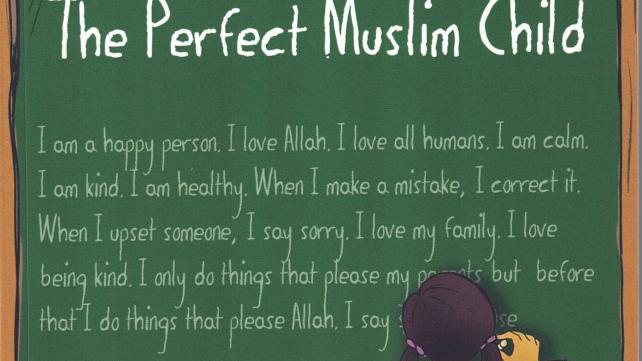
This is a first in a series of excerpts from “The Perfect Muslim Child: A Holistic Approach to Raising a Balanced Child” by Nargis Naqvi.
I remember when my daughter was thirteen she started to get upset over the smallest things. Banging doors, as she shut herself in her room to show how upset she was, became the norm. Of course the first few times she did that, we took action and made sure she never did that again. By going up and opening that shut door I would look at her in the eye and say, “I NEVER want to see you express your tantrums this way. Is that clear?”
Ignoring things when you know they can become a bad habit only solidifies that action. It is best to get up, address the act right there and then, and in a firm tone let them know that it is unacceptable. There is no need to scream. Just show them who is boss when they behave like a three year old. Then leave them alone to sulk. Later you can have a talk with them to go over why they did what they did and what they could have done better. There is always a reason in their minds for why they are upset, even if it seems silly to the parent. Trying to see things from their point of view and addressing it by just listening and understanding calms them down. Try to solve this with a hug and a kiss. They are working with their ego at this stage and must be trained slowly to say sorry, to own up to their mistakes and admit they are wrong.
After all the effort I had put into my daughter’s upbringing, I was wondering where I went wrong? Her mood swings were increasing and she was not the little girl I had known all along. All I had to do was think back to myself at that age. We often forget that we wanted to shut ourselves up in a room and listen to music, talk to friends and just sulk. We were trying to figure ourselves out, not being aware of these reasons. Our hormones are everywhere at this stage and if someone starts throwing tantrums in response to our tantrums then we break that relationship or at best stop trusting it.
Every family goes through different things in their household. Some have in-laws living with them training the kids their own way. Some have parents who don’t get along. Some parents work all the time. Some families have a few tragedies of death and illnesses that take attention away from the children.
Whatever situation your family is in, never lose control over your child. Nor over your marriage. Learn to be the “older and wiser” person in this household. You picking up this book and wanting to learn something indicates that you could be that person. If you have the desire to do something, then all you have to do is start digging around for a solution to your personal scenario. You will find it. Just be consistent and pray to Allah to help you.
Our family, due to my husband’s work, moved countries very frequently. The children would get used to one place, make friends and we’d be on the move again. It was traumatic for the child who wanted stability. My middle child showed her frustration differently than the eldest. She just quieted down and instead of showing anger by slamming doors, she would just sulk in her room and talk less. My son didn’t make friends wondering when we’d move next.
When my son turned thirteen, I decided I did not want another teenager that I would have to deal with like I had done patiently with my daughters. So I decided to play a mind game. I started to mention how his sweet nature was about to be destroyed because he would start throwing tantrums as a teenager. I would mention how I am dreading the heartache I would feel at his attitude. Because of that he made sure to never throw tantrums and would ask me, “Mamma, have I proven you wrong? See, I am not behaving like a typical teenager.” I would praise him and show surprise at his self-control and hug him. Of course I didn’t tell him that my reverse psychology was working. He was just trying to prove me wrong like any teenager and that was working in my favor!
The child after the age of twelve goes into a transition of not being a child anymore and yet not really becoming an adult. At times parents tell him to stop being a child, at other times they tell him to not try to be so adult like and that he’s acting too old for his age. Internally the body is changing and it's causing havoc to his mind. Women go through this their whole lives and call it PMS but they never understand the children transitioning through this age are also in PMS mode. I call it the Pre-Adult syndrome (PAS). It is just a matter of a few years when things will fall into place for them but they need their parents’ support through these awkward years.
Nargis Naqvi is also a life coach, founder of MY Voice Canada (an online magazine run by and for Muslim youth), and the Director of Training at the Sound Vision Foundation. She lives with her husband and three children in Ontario. You can purchase her book The Perfect Muslim Child on Amazon.



Add new comment